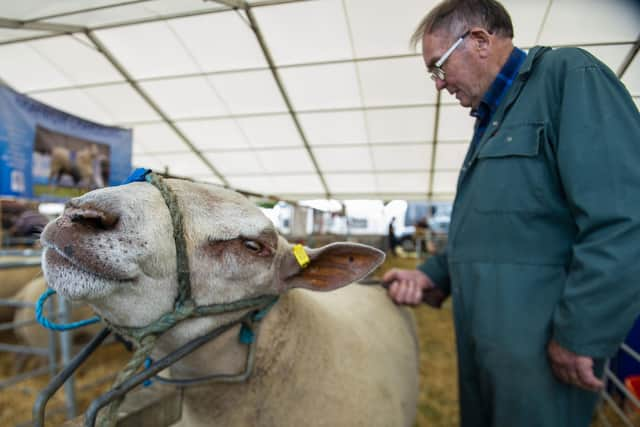Post-Brexit trade deals: Sheep farmers worst hit in Scotland, but sector generally sees 'limited' long-term impact, says report
Sheep farmers in Scotland will be hardest hit under new trade deals with countries outside the EU, while the overall long-term impact on the sector is generally “limited”, according to new research.
A new report, commissioned by the Scottish Government, assessed the impact Free Trade Agreements (FTAs) between the UK and Australia, New Zealand, Canada, and the Gulf Co-operation Council (GCC) will have on the agricultural industry in Scotland.
Advertisement
Hide AdAdvertisement
Hide AdResearchers looked at how the industry performed with the new deals in a Brexit and no-Brexit scenario. Results showed while the projected long-term impact of FTAs on Scottish output was relatively small in most cases, sheep farming was an exception.


Scottish sheep meat output was projected to fall by 10.5-11 per cent under the two scenarios, with outputs performing better in a no-Brexit situation, thus illustrating the importance of exports to the EU for sheep farmers.
The research, however, also noted additional pressures for sheep farmers, including poor profitability and added environment conditions brought about by land-use change in Scotland with the coming Land Reform Bill, specifically in terms of tree planting initiatives in upland areas. One interviewee to the report said hill farmers who are about to retire are all going into tree-planting.
Beef and wheat were also projected to fall under the FTAs, although the report said a trade deal with Canada was likely to generate export opportunities for Scotch beef.
Despite regularly reported post-Brexit pains for the sector, including labour shortages, the research found, in general, the long-term impact of the split with the EU would be limited on Scottish agricultural output.
For both wheat and barley, the report found there to be minimal differences in output in both the Brexit and no-Brexit scenarios.
And relative to other sectors, the projected impact on output prices on Scottish cereal farms arising from Brexit and the application of non-EU FTAs is also relatively low, with a long-term 2.6 per cent decline in cereals.
The report said this decline is due to a variety of factors, including long-term trends in agricultural commodity prices and the relative competitiveness of UK agriculture – trends which were occurring before Brexit and that “Brexit is not the central factor in these output declines”.
Advertisement
Hide AdAdvertisement
Hide AdFor dairy, the report said most of the decline in output from 2019 was due to factors “unrelated to Brexit”.
The report backed projections that increased trade barriers on dairy product imports into the UK from the EU will help the competitive position of UK producers.
And the introduction of FTAs are, on the whole, anticipated to drive an increase in milk output, it said, with liquid milk output forecast to grow by 3 per cent to 9 per cent in value.
The analysis indicated the opportunities arising from the new deals, particularly with the GCC, will eclipse the competitive threat posed by NZ. That said, researchers said the Scottish dairy sector would need to adapt as, according to industry participants, the GCC region is centred on high-value dairy products such as speciality cheese and yoghurt.
The report, however, does make it clear losing the EU and NI markets has had a negative impact on the sector, particularly the Scottish seed potato exports.
The report described this as “significant”, adding: “The restoration of this market access should also be a primary objective for policy-makers.”
And while the impact of the four FTAs mentioned are generally limited, the report said “the cumulative effect of multiple trade deals over the longer term should not be underestimated”.
This is especially if the UK agrees FTAs with agricultural powerhouses such as the US and Mercosur (including Brazil and Argentina).
Advertisement
Hide AdAdvertisement
Hide AdCommenting, Pete Wishart MP said: “I have lots of sheep farmers in my constituency, but the Tories don’t care about their fortunes. This research clearly shows the export market for Scotch lamb and sheep meat is likely to contract – and worse, that more countries will be able to put product on our supermarket shelves. Our sheep farmers’ best hope is to regain entry to the EU with access to the single market."
Rural affairs secretary Mairi Gougeon said: “The reports shows the current UK Government trade approach is not working in the interests of Scottish agriculture. We will continue to press for a coherent trade policy that makes agriculture a higher priority in future trade deals.
“We will use these findings to help identify future policy options to mitigate or address the differential impacts of trade, as part of delivering Scotland’s Vision for Trade.”
Comments
Want to join the conversation? Please or to comment on this article.